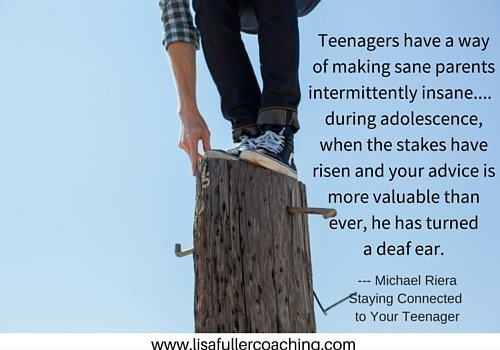 My relationship with my teen has been jaggedy.
My relationship with my teen has been jaggedy.
Over the past several months I’ve felt tested and provoked like never before. It’s not easy. We’re on solid ground right now but I admit to having intermittent moments of insanity.
One thing I’ve learned as a parenting educator and so called expert is that I’m not the only one going through this… that’s a relief. 😌
Are you facing challenges with your teen that leave you doubting yourself?
As my teen has veered into the territory of seriously challenging behavior, I’ve kept one goal in mind, as hard as it is, stay connected.
7 ideas for how to stay connected to your teen – even when they’re REALLY pushing your buttons:
- Exaggerate positivity — A study by Deborah Yurgelun-Todd found that teens use their “gut” as opposed to their frontal lobe to interpret facial expressions. In short an adult’s “fearful facial expression” was misinterpreted as anger, confusion or sadness 50% of the time.

Source:www.pbs.org/wgbh/pages/frontline/shows/teenbrain/interviews/todd.html
Knowing this, I’ve amped up my enthusiasm when I interact with my son and try to greet him with a huge “I love you” smile on my face — one that can’t be misinterpreted — when he comes home.
This strategy has helped me regain some closeness with him, and he frequently asks me to check in on him when he’s waking or retiring for the evening. You still matter to your teen, even though they’re doing their darndest to push you away.
2. Use a quiet tone of voice — Although you may be feeling emotional, when possible use a quieter voice with your teen. Similar to facial expressions, teens can interpret increased volume as anger.
3. Be explicit — When you ARE angry or annoyed about something say it in plain language, using as few words as possible. For example:
I’m angry that you didn’t text me letting me know you’d be late.
I’m angry because I’ve been so worried that something happened to you and I love you.
Try to avoid lecturing or adding editorial comments (e.g., “We have talked about the need to text me back a million times and I’m sick of it!”). You may find that stating your feelings clearly calms you down too.
[tweetthis]Sometimes it takes a moment for us to uncover why we’re angry at our teen… oh yeah, it’s because I would step in front of a bus for this kid if necessary![/tweetthis]
Deborah Yurgelun-Todd’s study supports this strategy, too.
4. Make yourself available to your teen, even when it feels inconvenient. The other night I was snug in my bed when my teen came home and asked me to come watch Survivor with him. I did 🙂
5. Use humor — Teens take themselves seriously. The angst and insecurity they feel is real for them even though you may see it as overly dramatic. I’ve found humor – the cornier the better – can provide a counter weight to all that teen gloom. Ridiculous as it sounds, I use silly voices, faces and poop talk. These tactics lighten ME up and make me laugh.
I’ll spare you the details but one night I was woken by police banging on my door. Apparently I had to retrieve my son from a parking lot not far from my home. When I arrived, he was fine, his “crime” with sitting in a car with a girl (no substances). He got in the car and looked at me, afraid of my reaction. I cracked a smile and started laughing. He said “Mom, I’m glad you’re laughing. I’m sorry you had to to come get me.”
Use your sense of humor to bring levity to what can feel like a heavy relationship with your teen. They’ll be relieved that you’ve got space to breathe and have fun and it just might open the door for them to do the same.
6. Post a visual reminder that clearly shows the essence of your child — Find a photo of your teen as a younger person – a photo that you love – with an expression on their face that captures your heart. Carry this photo with you or put it somewhere easy to see. Use this as a visual reminder of who this kid really is in his heart. Your teen can look and act downright ugly and an image can remind you of the deep love you have for him, even when you’re not feeling it every moment.
of your teen as a younger person – a photo that you love – with an expression on their face that captures your heart. Carry this photo with you or put it somewhere easy to see. Use this as a visual reminder of who this kid really is in his heart. Your teen can look and act downright ugly and an image can remind you of the deep love you have for him, even when you’re not feeling it every moment.
7. Take care of yourself — Make this a priority because in order to be on top of your game, in order to actually do 1 – 5, you need a deep well of strength to draw from. Remember, children do better when they feel better and so will YOU. You can’t expect humor, listening, positivity, etc. from yourself when you’re depleted.
Exercise, rest, see friends, get outside- whatever fills your tank, find time to do it. Your teen will thank you!
Parenting a teen is no joke. Dig deep, breathe deep, and in that quiet space invite faith that they will be okay, that you’re doing the best you can by being present when you can, setting limits as needed and providing unconditional love. They won’t be an adolescent forever.
Lastly, although parenting a teen can lead to a deep desire for control – especially when their behavior seems out of control – the same principle of kindness and firmness applies. Although I’m tempted to ‘lay down the law’ with my teen, I know that if I lose connection with him, I have no chance of helping him make good choices in his life.
Have you found other ways to manage difficult adolescent behaviors? Please share in the comment section below or send me an email. I love to hear from you.
If you’re in the Bay Area, join me for Parenting with Positive Discipline. This series is geared for parents of children of all ages.
Ready for more, watch this in-depth interview where Dan Siegel discusses his book Brainstorm ~ the scientific developmental stage of adolescence.




I love your article. You are so right. The relationship is the most important thing.
Thank you Jackie 🙂